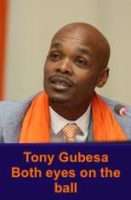With the country’s unemployment rate escalating, more and more unemployed people are turning to ‘volunteering’ to gain life and work experience. Volunteering means working for no pay, or perhaps a small daily rate. It is known to provide people with the skills and experience that may appeal to potential employers. Tony Gubesa (37), from Khayelitsha in Cape Town, can testify to that.
“After I had done my matric in 1997 I didn’t have money to further my studies so I did quite a lot of volunteering work … which landed me in Joburg,” he recalls. His work journey continued and he is currently Khayelitsha Site Manager for an international organisation that aims to, ‘educate, inspire and mobilise young people around the issues of HIV/Aids’: Grassroot Soccer (GRS).
But, he’s one person who knows all about humble beginnings. “It was sad to see the people I grew up with furthering their studies but I never felt like a failure cos I knew the circumstances at home,” he says.
Tony spent his early childhood in the dusty streets of Gugulethu but the family later moved to Khayelitsha. He lived with his grandparents.
Tony’s parents were not married and that had an impact on his relationship with them. “My mom got me while she was still at home and my grandparents therefore took me as their last born. She was there, but I regarded her as my older sister,” he explains. “Growing up in Gugulethu had its own challenges but my grandparents ensured I wasn’t caught up in the mix.”
That popular quote, “You never know what you’ve until it’s gone,” is not just a cliché to him, it’s something that Tony truly relates to.
“My dad was occasionally there. We just knew each other but our ‘relationship’ improved after he had passed on. I started to realise that I needed him more when he was away, than when he was still around. When he passed away – that’s when it started to hit me that I could have had a stronger relationship with him,” he recalls.
Life was throwing stones at him left and right, but he just embraced them and built a staircase with them.
“I understood the situation at home but I never allowed it to break me. I knew there was greatness within me. I was identified as a young, potential black leader to go for a national youth service program. It was designed by the South African government to promote young, emerging leaders.” He says that all these opportunities came through the organisations he had been volunteering for.
“Ever since I started volunteering I always wanted to do community development. I wanted to do anything that’s in line with improving other people’s lives, using my background as a motivation.”
Then in 2003 he got a job offer in Joburg, and he began work there as a Programs Coordinator.
“I facilitated life skills training sessions and trained facilitators. My job was also to make sure we’ve an exit strategy so the trainees could have a career path set for them when they leave,” he explains.
In 2006 Tony moved on to work for another organisation which offered Maths and Physics to students who were not doing well academically.
Working life was going well for him, but not for his big heart. “I was already feeling homesick after being in Joburg for about six years. A part of me wanted to come back to Cape Town and work with young people, cos I had invested a lot of my time, energy and knowledge improving the lives of young people of Soweto. Now, it was time come back and plough into the community that raised me.”
As someone who had been gone for years, the Mother City had a little something in store for him.
“My leaving Joburg proved to be a blessing in disguise because GRS had wanted to employ trainers, so I applied – and got the job!”
Working at Grassroot Soccer meant he had to start rolling throughout Africa like the soccer ball he worked with.
“In 2009 I started there as a master trainer. My role was to go around the African continent, as we’ve other sites in the other parts of Africa. I trained our volunteers throughout Africa, based on the curriculum GRS had put to together.”
Tony always knew he was destined for great things and life did nothing less than proving him right, eventually.
“I did that work from 2009 until 2011 and then I was promoted to a program coordinator. I supervised the trainers and made sure I capacitated all the sites to deliver quality training. In 2013 I got another promotion to be the Site Manager, which is the position I currently occupy.”
Tony ensures that Grassroot Soccer scores their goal of eradicating HIV/AIDS. “My role is to oversee programmes in Cape Town and Khayelitsha sites. That programmes are run smoothly and we stick to the promises we’ve made to the funders. I manage our budget as well.”
Tony seems to have the numbers figured out, but what about his players on the ground?
“I have learnt to master people skills. I’ve learnt to listen, empathise and to mediate. One thing I’ve been taken advantage of by, is that I listen to everyone. I listen with a neutral mind and find it difficult to reprimand people to get them to do what’s expected of them.”
So what does he substitute reprimanding with?
“Instead, I constantly motivate them and by doing so it has helped me, because I never have to be running after people. They know what’s required of them and deliver.”
GRS innovates, and is unique in its approach to HIV and Aids education and awareness.
“We’re not solely about soccer; our curriculum uses soccer metaphors to pass our messages. For example, we refer to our volunteers as ‘coaches’ not as volunteers. Our life skills sessions are called ‘practices’. Our curriculum is in sync with the Life Orientation subject so the coaches deliver their practices during the LO session.” He adds that they’ve developed solid relationships with schools and their programmes are welcomed as fun and interactive.
“One of our programmes is focused only on girls, where we take them through an eleven-week programme around sexual reproductive health, and a little bit of soccer.”
Children are quick to forget what you said in class but not so much about how you allowed them to play. He cites one example:
“While they play their games in the field, we bring them back to the discussion table and allow for debates. For example, if one of them hits a cone their entire group will take a punishment. The lesson is that you are not the only one who suffers when you’re HIV+; your friends pay the price too.”
In 2015 Tony was invited to the United Nations (UN) to make a speech around the commemoration of ‘16 Days of Activism for no Violence Against Women and Children’.
“We men in South Africa are perpetrators of sexual violence against women, young girls and children. However, the problem doesn’t begin or end in November. This calls for 365 days of activism. We need to preach this gospel throughout the year,” his speech read.
He believes that the trick perhaps lies in a new approach.
“The older males date and infect young girls. What’s the purpose of equipping girls? Girls are not the perpetrators of gender based violence! It’s [males] that we should be engaging,” he exclaims.
Tony holds the view that a soccer ball shouldn’t be the only thing that fathers ‘pass’ on to their sons. “It starts at home. If our boys see how we treat their mothers then they’ll mimic that when they grow up. My grandfather always used to say, ‘The greatest gift you could ever give to your children is to love their mother’. If we change one boy then we’ve done our job because he’ll tell his friends,” he adds.
He says society decides who’s a role model, but their criteria is too flawed; many of the admired men provide negative role models.
“There are people who qualify to be role models but they’re not perceived as such because they don’t drive fancy cars or live in the suburbs. Therefore, we need to develop a monologue where we unpack the roles of a role model and revisit our definition,” he concludes.
“The problem with the society is that it teaches women to be careful not to get raped, instead of teaching men not to rape.”
Find out more about Grassroot Soccer here: www.grassrootsoccer.org







